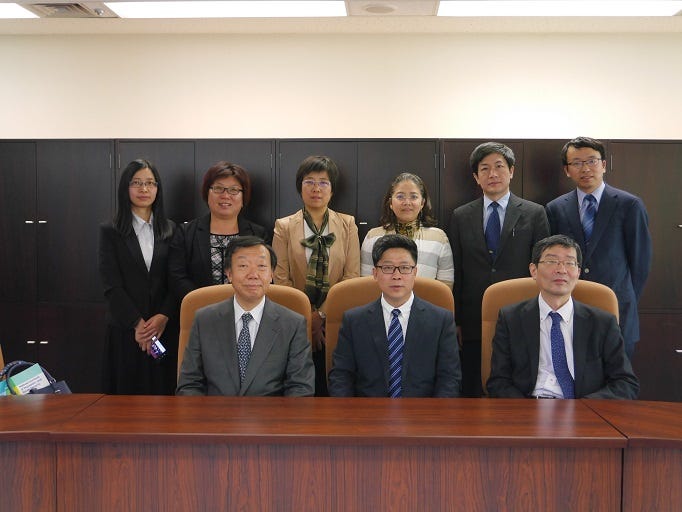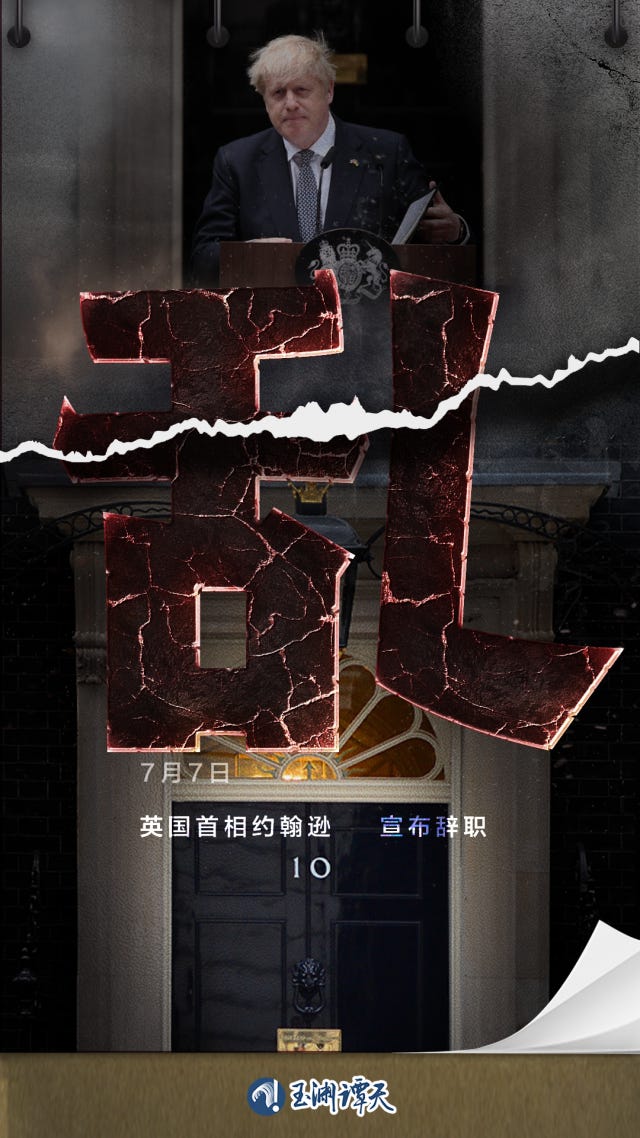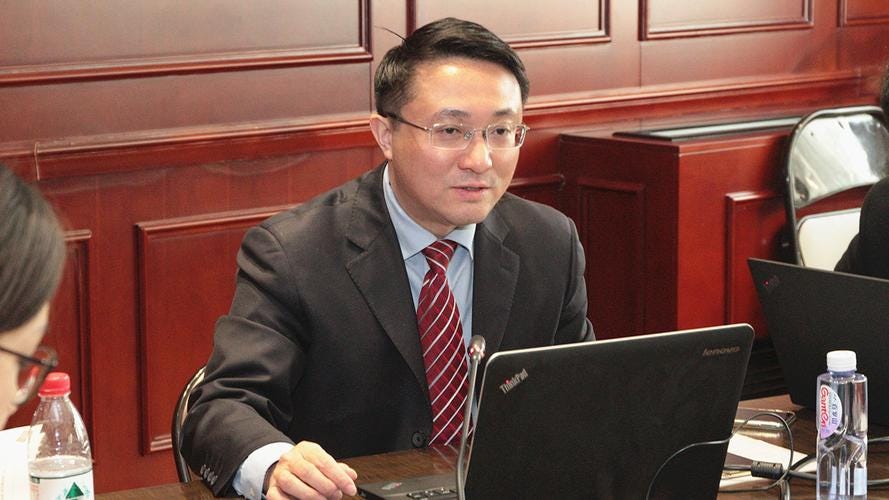Discourse Power | July 12, 2022
Mind games, remembering Abe, mind the governance gap, and Europe's pipe dream
Top Picks
“A war in which the smoke of gunpowder can be seen destroys the flesh, but a smokeless war breaks the heart”
Professor Qin An, director of the Internet Policy and Law Research Center at Tianjin University's Law School, warns that the US and other Western powers have been engaged in a long-running cognitive war against China.
Excerpts:
“According to Russia's Sputnik news agency, Moscow University's political science department will launch a master's degree program to prepare future fighters to deal with "color revolutions" 颜色革命.
“The program's main goal, based on its curriculum, is to prepare participants to deal with the US and the West's cognitive warfare against Russia.
“The most intense "shoot-out" 交火 in the Russian-Ukrainian conflict, aside from the use of firepower, is Cognitive Warfare 认知战, which makes use of Information Warfare 信息战 and Cyber Warfare 网络战.
“A war in which the smoke of gunpowder can be seen destroys the flesh, but a smokeless war breaks the heart. In light of this, Moscow University’s new program is timely and merits the attention of other nations that are being oppressed by the US and the West.
“Cognitive Warfare is currently in full swing on a global scale, including within NATO, the world's largest military alliance. On October 8, 2021, US news platform The Grayzone reported that NATO is developing a new type of warfare, that is, Cognitive Warfare.
“Under the guise of "Russian and Chinese threats," they are vying for "brain control power" 制脑权 [also translated as "mental/cognitive dominance"] in the "human domain" 人类领域, attempting to "weaponize cognitive sciences" and [in English:] make everyone a weapon.
“Cognitive Warfare in its broadest sense seeks to subvert the human will, spirit, and psyche. The enemy's cognitive foundations are constantly disrupted, so as to achieve the strategic goal of demoralizing the hearts and expelling the will 攻心夺志. It is achieved through operations in the physical domain in addition to the utilization of the information domain, and attack and defense maneuvers in the cognitive domain.
“The Chinese are no strangers to this; it's all about "subduing the enemy without fighting" [Sun Zi], an aphorism that has become more significant than ever due to the rapid growth of the Internet.
“While graduate students in the Russian program will receive a certificate in the more traditional field of Conflict Management, the curriculum actually includes courses in the psychology of extremism, information support in special and police operations, specialized propaganda, combating disinformation, counter-intelligence, and even neuro-linguistic programming (NLP).
“In other words, professionals in the field will first wield a strong sense of struggle 斗争意识, followed by psychoanalytical skills, which typically involve knowledge and abilities closely related to information and network technologies, including cyber security.
“The US and other Western powers have been fighting a Cognitive War against China for a long time, as evidenced by NATO's designation of China as a "systemic challenge."
“Two other examples include the use of false allegations to smear the image of the cotton industry in Xinjiang and malicious speculations about Sino-Russian relations. Consequently, we must immediately begin cultivating and preparing professionals in this field, as suggested by the following recommendations.
“First, given the dynamic nature of international relations, it is imperative to pay close attention to the development of combat-ready talents in the diplomatic sphere.
“Cognitive Warfare is a smokeless war designed to demoralize hearts and expel the will, with consequences that go beyond simply reshaping international relations. They are critical components of a direct conflict with the enemy 敌 in the cognitive domain.“Second, it is vital to stress the importance of multi-talented individuals who possess both strategic awareness 战略意识 and technical know-how.
Cognitive Warfare is a high-tech cyberspace contest that must consider the big picture 全局观, a strategic outlook 战略观, and the Comprehensive National Security Concept 总体国家安全观, all of which are aided by cutting-edge technology as their "wings" 翅膀.
In addition to multi-talented individuals, this will necessitate the assistance of military teams 团队作战 as well as defense equipment and support 装备支持.“Third, we need to assemble elite strategic talent 高端战略型人才. Cognitive Warfare necessitates high-end talent and strategic national resources. Some comrades who have recently retired from relevant important positions and have strong ideological consciousness and a wealth of struggle experience are valuable assets in this regard.
Those with extensive experience and knowledge of the opponent's tricks, in particular, can join the front line to improve our ability to respond.“Fourth, we must employ hands-on personnel who are constantly surfing the Internet. Cognitive warfare is a never-ending battle that requires personnel to work long hours and be familiar with cyberspace, which is as unyielding as the ebb and flow of electricity. To that end, we must be adept at selecting all types of practice-oriented cyber talent 实践型网络人才 in order to maximize our aggregated force.
“The Internet is the new frontier 新疆域, and the mind is the new battlefield.” (Global Times’ Chinese website)
***
Smokeless War is also the title of Manoj Kewalramani's most recent book, which details the Party-State's efforts to gain greater discourse power and political primacy as it sought to turn COVID-19's potentially existential crisis into a historic opportunity. Kewalramani is the chairman of the Indo-Pacific Research Programme and a China studies fellow at the Takshashila Institution, a non-resident senior associate at CSIS, and the author of the mandatory Substacks Tracking the People’s Daily and Eye on China.
“The essence of Abe's irrational, non-constructive, and non-sustainable "political legacy" will eventually be abandoned and forgotten“
Former Japanese Prime Minister Shinzo Abe, 67, was assassinated on Friday while addressing the public in a street rally. Abe is remembered by Yang Bojiang and Lu Hao, respectively the director and associate researcher of the Institute of Japanese Studies, Chinese Academy of Social Sciences (CASS), for the "assertive and global nature of Japan's security strategy that accelerated further under his leadership."
Yang and Lu claim that Abe's efforts to "break through the shackles of the pacifist constitution" and hasten Japan's normalization of its national defense and military power have "put the Asia-Pacific region's peace and stability in danger."
For example, they consider Abe’s "strategic diplomacy" of visiting more than 80 nations and regions while in office, more than any Japanese prime minister, clocking in at 1.58 million kilometers, or more than 39 orbits around the globe.
The authors bemoan that "in an effort to demonstrate the country's "moral and just" character, Abe also proposed high-profile concepts such as "panoramic perspective of the world map," "proactive pacifism," and "free and open Indo-Pacific”."
“In actuality”, they write, “Abe's diplomacy was based on a strong sense of realism, power politics, and geopolitical rivalry. His chief concern was the great-power game.”
Yang and Lu further write that “as the "spiritual leader" of the conservative forces in contemporary Japanese politics, Abe's passing won't just stop his supporters from doing what they were doing; it might even inspire them to act more tenaciously, gaining sympathy and support by completing Abe's "unfinished business".”
“Yet it's crucial to remember that Abe's "political legacy" cannot entirely determine Japan's political landscape. Abe's notion of examining Japan's "strategic initiative" and "dynamism" in terms of foreign and security policy will continue to be influential for a while.
“The radical elements, such as Japan acquiring its own nuclear force or sharing one with the US, as well as a significant improvement in its offensive military capabilities, however, won't turn into actual policy anytime soon.
“It will be even harder for Abe's ill-conceived claims of American-Japanese military cooperation in "joint defense of Taiwan" to materialize into real policy.
“The current administration is attempting to alter Abe's previous views on the Korean Peninsula and Russian diplomacy in order to take into account the recent changes. There are clear echoes of the Abe era in Japan's use of international crises to advance domestic strategic transformation and increase its foreign strategic influence in the context of the ongoing Russia-Ukraine conflict.
“However, in the face of changes in the international order and national strategic transformation, Japan's specific response measures will have to change, and Abe's "political legacy" of irrational, non-constructive, and non-sustainable substance will eventually be abandoned and forgotten. (Guangming Daily)
“Hegemonic inertia has exacerbated the global governance deficit”
In response to recent developments in Sri Lanka, Professor Xu Liping believes that Xi Jinping's vision of "a community of shared future for mankind," facilitated by Xi's Global Security Initiative (GSI) and Global Development Initiative (GDI), is the right "prescription" for the world's ailment of peace deficit, trust deficit, and governance deficit.
Xu is a Southeast Asian studies research fellow at the Chinese Academy of Social Sciences (CASS) in Beijing.
General Secretary Xi Jinping identified the world's "four deficits" as "governance deficit, trust deficit, development deficit, and peace deficit."
Excerpts:
“We must carefully examine the various quirks of the current global governance deficit, prescribe the proper medication, and better utilize global governance in order to address the aforementioned systemic crises.
“First, the global governance deficit has been exacerbated by the peace deficit. Traditional security threats have returned to the center of the international horizon as a result of the Russia-Ukraine conflict. The peace deficit has widened, exacerbating the trust deficit among major powers, and the foundation of global governance has shaken to the core.
“Terrorism, climate change, the financial crisis, the energy crisis, the food crisis, highly-transmissible infectious diseases, and other non-traditional security threats are also on the rise, posing unprecedented challenges to global governance.
“Second, hegemonic inertia 霸权惯性 has exacerbated the global governance deficit. It has distorted the just international political and economic order, resulting in a lack of participation by many developing countries in global governance and a worsening of the global governance deficit.
“Third, small cliques limit the effectiveness of global governance. A number of major powers have formed small cliques based on their narrow self-interests and so-called shared values, diluting the real value of global governance by using it as a tool for geopolitical games.
“In the current crisis in Sri Lanka, the United States, Japan, India, and Australia proposed forming a foreign aid consortium to respond to the crisis collectively. On the surface, each of the four countries has a distinct role to play, but by working together, they "legitimize" the Quadrilateral Security Dialogue's (the Quad) ability to respond to the crisis more effectively.
“In reality, the Quad is a small grouping that has sought to marginalize and restrict China's influence, and they are attempting to use the crisis to pull off a stunt designed to limit China's role in Sri Lanka.
“To address the challenges of peace deficit, trust deficit, and governance deficit, the international community should uphold the vision of a community of shared future for mankind, improve the global governance structure, and enable it to play a more constructive role:
“First, we must work together to maintain peace and lay the groundwork for a favorable environment for global governance. Peace necessitates the elimination of the trust deficit among members of the international community, as well as the establishment of various consultative mechanisms to protect it.
“Second, there is a need to coordinate development and security in order to find a good global governance formula. Security is a prerequisite for development, and development guarantees security. To promote both development and security, China has proposed the Global Development Initiative (GDI) and the Global Security Initiative (GSI).
“Furthermore, this is an opportunity to establish an emergency response mechanism to compensate for the shortcomings of global governance. The international response to the Sri Lankan crisis demonstrates that the existing international multilateral financial institutions are incapable of effectively responding to the crisis, and global governance continues to lack an effective emergency response mechanism.
“We can replicate the Chiang Mai Initiative, [a currency swap arrangement] launched jointly by China, Japan, South Korea, and ASEAN at the start of the Asian financial crisis, and set up a similar emergency response mechanism to avoid sovereign debt defaults and the spread of multiple crises in the relevant countries during the crisis.” (Global Times’ Chinese website)
“In a word, chaos! It's possible that the turmoil in the UK may be the harbinger of what's to come for the West”
Party-state blogger Yuyuan Tan Tian 玉渊谭天 rejoices in schadenfreude over British Prime Minister Boris Johnson's mortifying resignation, believing its a sign of the US-led West’s decline as a whole. The essay was shared on China Daily, among other state-owned platforms.
Excerpts:
“The essence of the current political mess is a chaos of governance 治理之乱; Johnson has ignored the interests of the British people, ignored the demands of the people, and deceived himself, resulting in the current political chaos.
“In the face of governance chaos, Johnson's choice is to fight chaos with chaos, diverting domestic attention to the Russian-Ukrainian conflict rather than solving the problem.
“The Johnson administration's choice to combat chaos with chaos reflects its misperceptions of itself. Britain still basks in its former colonial glory and is oblivious to the shifts in its status and relative power over time.
“To put it bluntly, while Britain's power and times have changed, its way of thinking has not.
”The turmoil in British politics this year may appear to be an unfortunate incident, but it is actually the result of a long-term trend.
”We have entered an unstable era, according to Cambridge scholar Martin Jacques. The decline of the United States is the most significant factor contributing to this instability.
“In recent years, the trend of the times in which globalization is accelerating and multilateralism is becoming the norm has been weakening America's absolute dominance in economy, science, and technology.
“To make up for the "deficit" 赤字 created by these advantages, America is desperately trying to increase its influence in other areas.
“As the primary driver of the Russia-Ukraine conflict, the US has sparked a war in Europe in order to mobilize more of its allies, strengthen its grip, and weaken its opponents.” (Yuyuan Tan Tian)
"European political elites bought into a myth, believing that they could free Europe from its "supply chain reliance" on China. Europe's dependence on the import of Chinese goods is even more pronounced in the current environment of skyrocketing prices"
"Is China losing Europe?" asks Xin Hua, research professor and executive deputy director of Shanghai International Studies University's Center for EU Studies (SIES).
The first section examines the perspectives of a dozen prominent Western scholars and think-tanks, analyzing the blow to Sino-European relations caused by the war in Ukraine.
In contrast, Xin is sanguine and provides the following reasons:
Sino-EU economic and trade relations still have significant complementarity and profound potential for cooperation. Since the beginning of 2020, China has surpassed the United States to become the EU's largest trading partner: “Despite occasional disagreements, the annual growth rate of China-EU trade volume reached a record high of 27.5% in 2021”, and “China has been Germany's top trading partner for the past six years”;
Cooperation with China is essential for Europe to continue implementing a host of global governance-related policy frameworks, such as the green new deal, digital transformation, and cooperation in the Asia-Pacific region, which is in part determined by China's enormous size;
The post-World War II strategic culture of Europe contradicts the notion that the continent would completely turn against China: “In addition to being well-versed in the theory of balance of power, Europe, the cradle of the modern nation-state system, also has a strong sense of cultural consciousness and political autonomy, and it will never be willing to submit completely to extraterritorial superpowers.”
Xin concludes: "For years, the EU has viewed itself as a "normative" force that exports "post-modern" norms to other countries. The "post-modern" dream, however, has been destroyed by the Russia-Ukraine conflict, forcing Europeans to return to "modernity," that is characterized by geostrategic rivalry.
“China and Europe, which are similar in size but geographically separated, not only have no direct strategic interests in common but also have enormous potential for economic cooperation.
“With its extensive historical geopolitical experience, Europe can tell the difference between China and the United States, and therefore, the proposition that "China is losing Europe" is false." (Aisixiang)
Playing in the Background
A reminder to secure your mind ecology, courtesy of Shakti’s John McLaughlin, L. Shankar, Zakir Hussain, and Vikku Vinayakram:
Discourse Power is written by Tuvia Gering, a research fellow at the Jerusalem Institute for Strategy and Security, a non-resident fellow at the Atlantic Council’s Global China Hub, and a Tikvah’s Krauthammer Fellow, specializing in Chinese security and foreign policy, and emergency and disaster management. Any views expressed in this newsletter, as well as any errors, are solely those of the author. Follow Tuvia on Twitter @GeringTuvia








